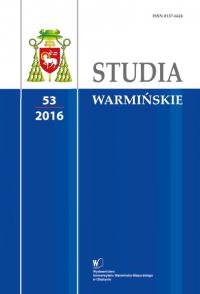Heimat- und Vaterlandsliebe als Identitätskonstituenten des frommen Ermländers. Ein Beitrag zum Konstrukt der ermländischen Identität im „Ermländischen Hauskalender“ (1857-1938)
LOVE FOR THE HOMELAND (HEIMAT) AND MOTHERLAND AS THE KEY COMPONENTS OF WARMIAN RELIGIOUS IDENTITY. A MODEL OF WARMIAN IDENTITY IN THE “WARMIAN HOME CALENDAR” (1857-1938)
Author(s): Barbara SapałaSubject(s): Ethnohistory, History of ideas, Local History / Microhistory
Published by: Wydawnictwo Uniwersytetu Warmińsko-Mazurskiego w Olsztynie
Keywords: folk calendar; Warmia; identity model; homeland; motherland; Catholicism
Summary/Abstract: Representatives of the Warmian intellectual elite, who published the “Warmian Home Calendar”, intended to create a medium adjusted to the needs and mentality of the local community. They developed a tool which had great ideological potential and could be used for shaping religious as well as political and social attitudes. From the very beginning, the model of Warmian identity promoted by the “Warmian Home Calendar” had three main interrelated components. Apart from the Catholic faith, based upon forms of religious belief specific to the Warmia region, these identity constructs are comprised of love for the homeland (Heimat) and love for the motherland. However, an analysis of the available volumes of the “Calendar” revealed that the desired model of Warmian identity, based on the above three pillars, was unstable, and its components underwent modifications in response to the changing political situation.
Journal: Studia Warmińskie
- Issue Year: 53/2016
- Issue No: 53
- Page Range: 403-420
- Page Count: 18
- Language: German

